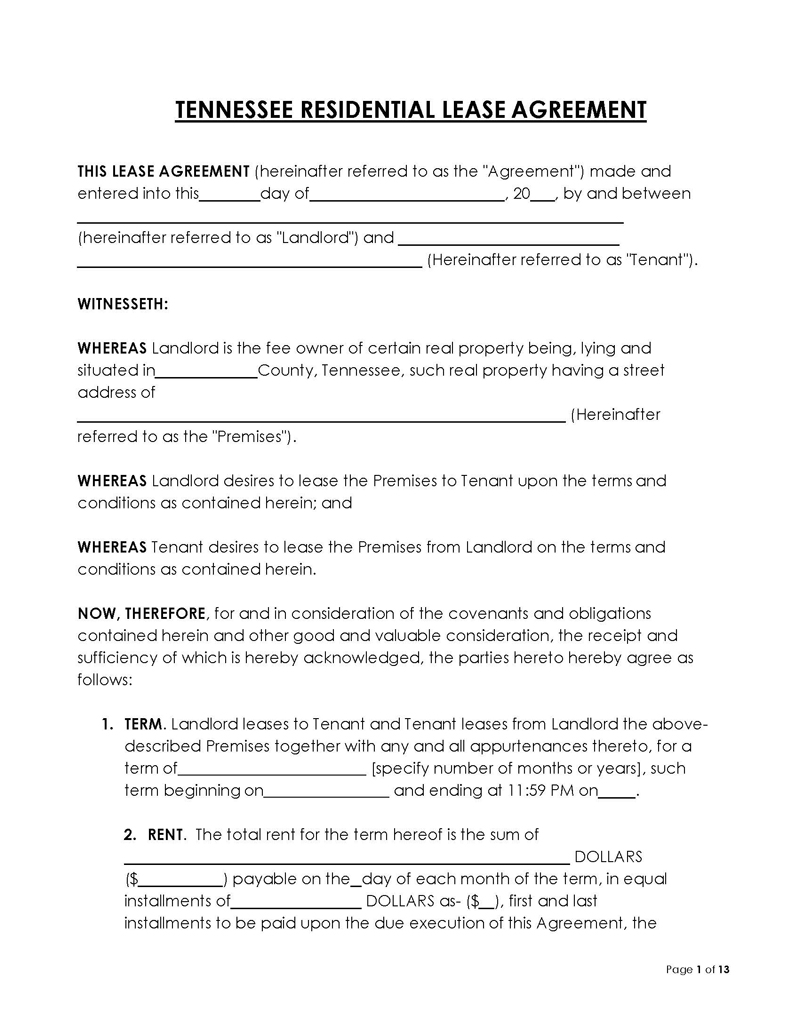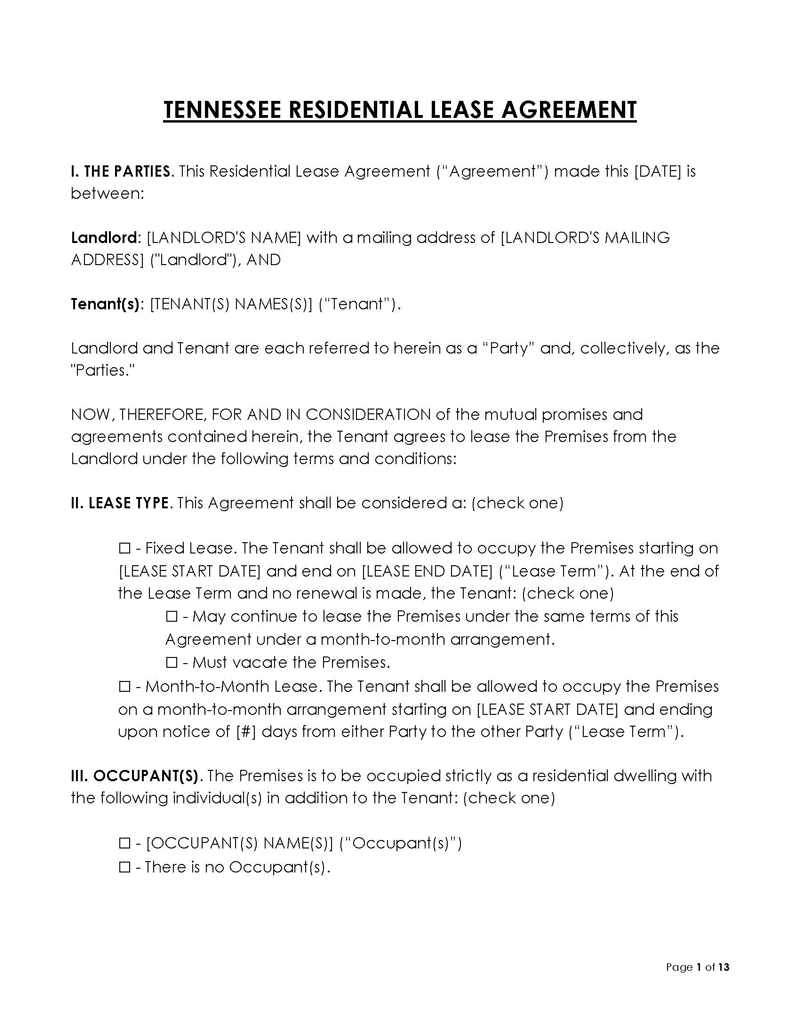Tenants and landlords must enter an agreement to ensure the process is done right to prevent any conflict or legal issues. The agreement contains all the contract details when renting a residential or commercial property. This sort of agreement is called a lease agreement, and in Tennessee, there is specific information that must be included in the agreement.
In this article, we’ll be talking about the Tennessee lease agreement, its details, different types, and how to write it.
Tennessee Lease Agreement
A Tennessee lease agreement (or rental agreement) is a legal document that highlights a contract between a landlord and a tenant who will use the landlord’s property by paying a set amount.
Usually, information like the agreement term, the rent amount, other financial obligations of the tenant, and the landlord’s terms and conditions regarding late fees, maintenance, and further necessary details are included in the agreement.
A landlord should also verify a potential tenant’s credit and source of income through a rental application before leasing out the property to them. A landlord must also pay attention to disclosures when drafting this agreement in Tennessee.
EXAMPLE
According to the Tennessee Lead-Based Paint Disclosure and federal law, a landlord must inform their tenant about the condition of the property’s painting if it was built before 1978.
Similarly, if a landlord visits the property up to 30 days before the lease term expires, they must state it in the agreement. In other words, they can visit unannounced but must notify their tenant of the visit to the rental unit at least 24 hours before they go. More associated laws can be found in the Tennessee Uniform Residential Landlord and Tenant Act.
Once both parties have dated and signed the contract, the tenant can move into the property.
Types of Tennessee Lease Agreements
These agreements vary by property type. Since there is no one-size-fits-all lease agreement, it is essential to draft which is suitable according to the kind of property.
The various types include:
Association of realtors agreement
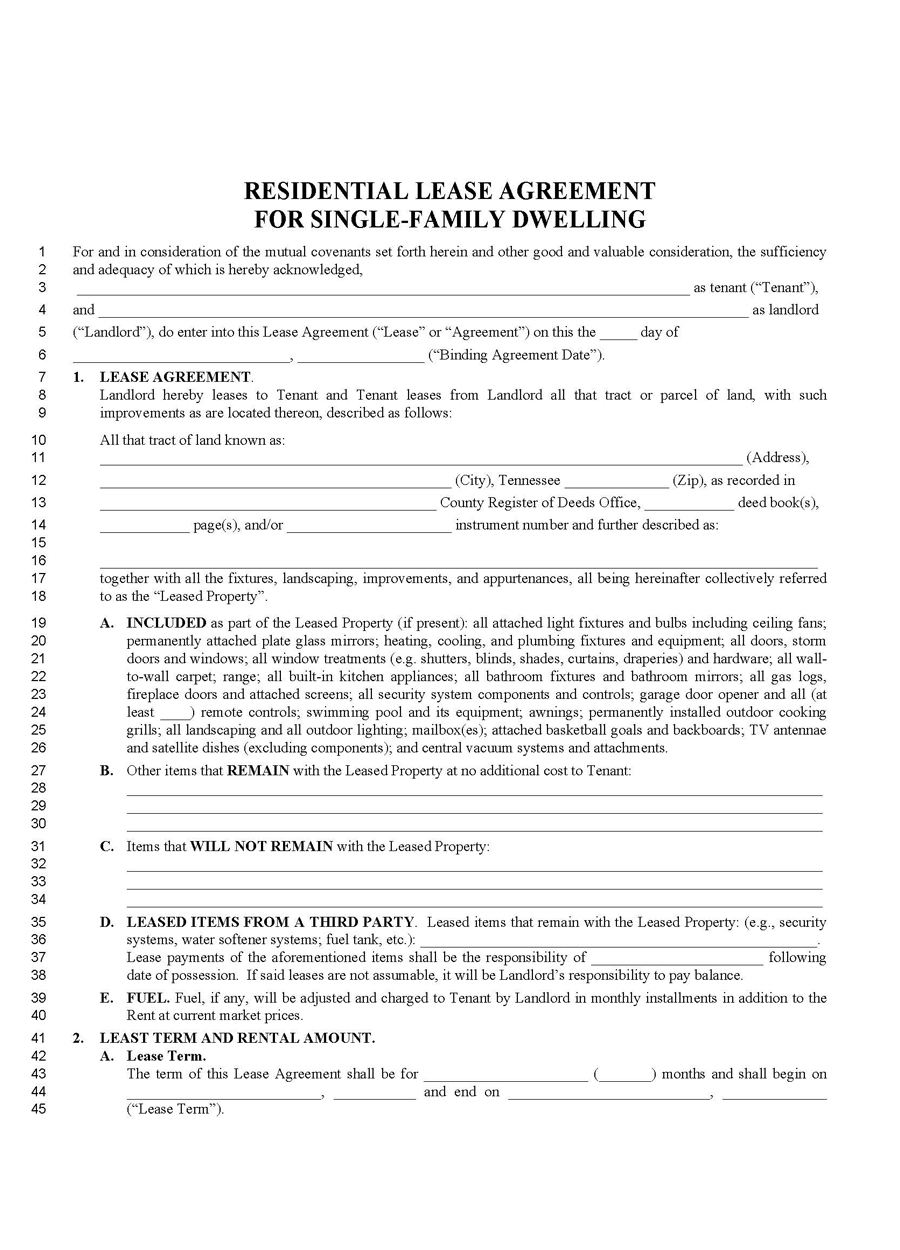
A Tennessee association of realtors agreement is a residential contract between a landlord and tenant for a single-family dwelling. The document highlights the rental and security deposit amounts, tenant rights and responsibilities, landlord’s obligations, rules and regulations, and other associated laws. A tenant has exclusive property ownership during the agreed lease term with this type of lease.
Commercial lease agreement
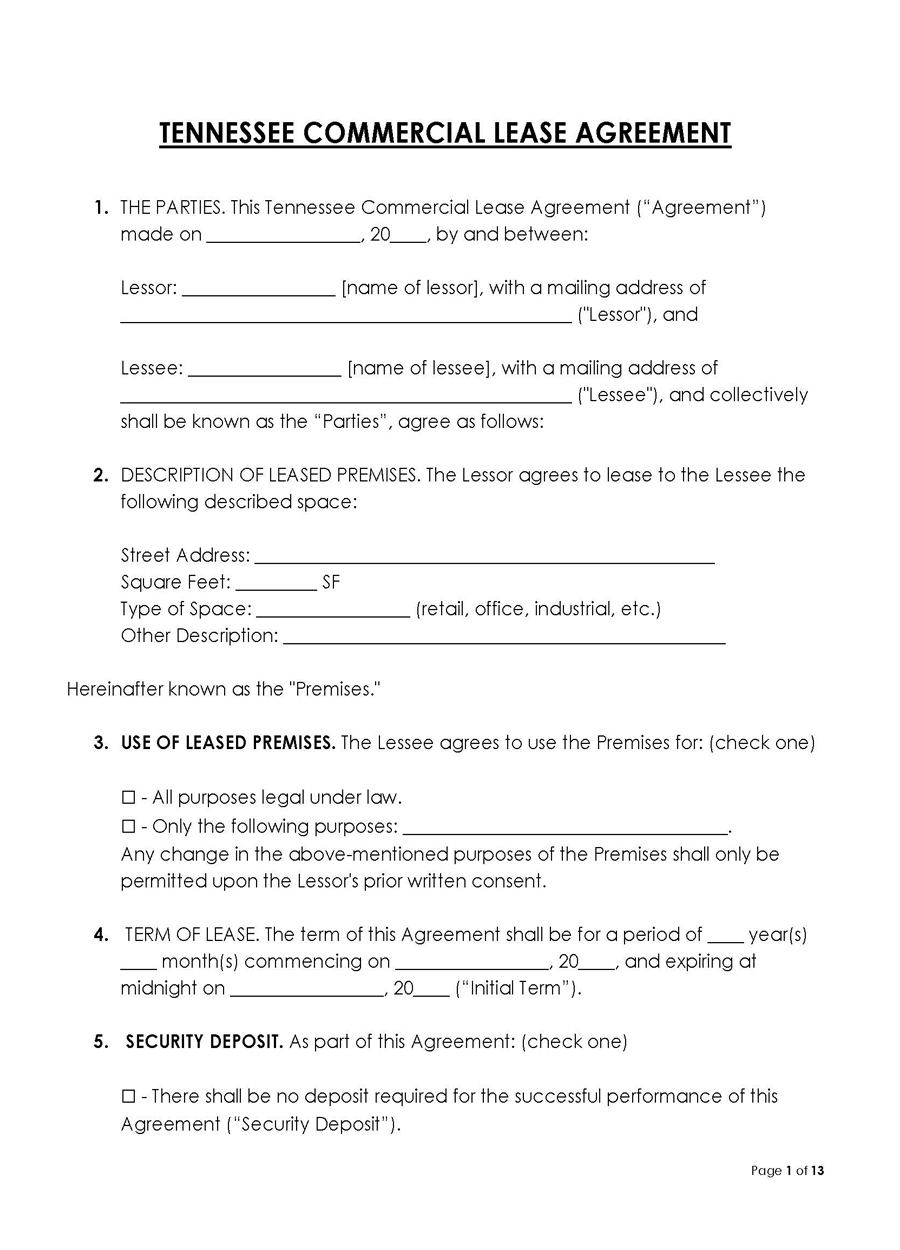
A Tennesse commercial lease agreement is a legal contract between a landlord and a tenant who wants to use the landlord’s property for business purposes. This kind of agreement is used for offices, warehouses, retail outlets, industrial spaces, etc. .
note
A commercial lease agreement is usually complicated, so it might be best to have an attorney when drafting it.
Farm lease agreement
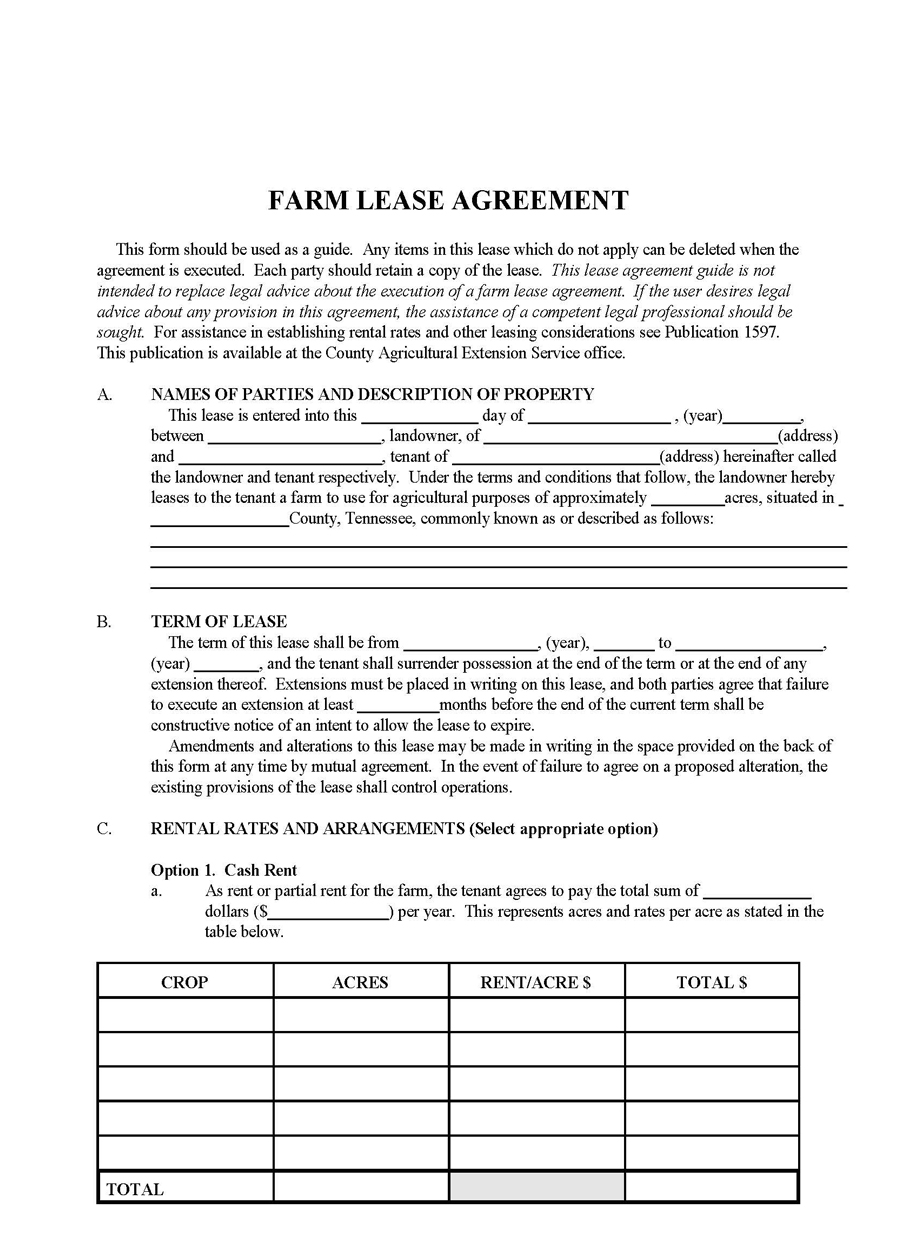
As the name implies, a Tennessee farm lease agreement is a contract between a farm-land owner and a tenant. Usually, a farm lease should contain information about farm upkeep, what animals can be reared on the farm, what crops can be planted, how to maintain the soil conditions, the lease amount and term, etc.
note
A farm lease agreement isn’t usually complicated, but it might be best to hire an attorney who has enough knowledge about such an agreement if the terms are unknown.
Month-to-month lease agreement
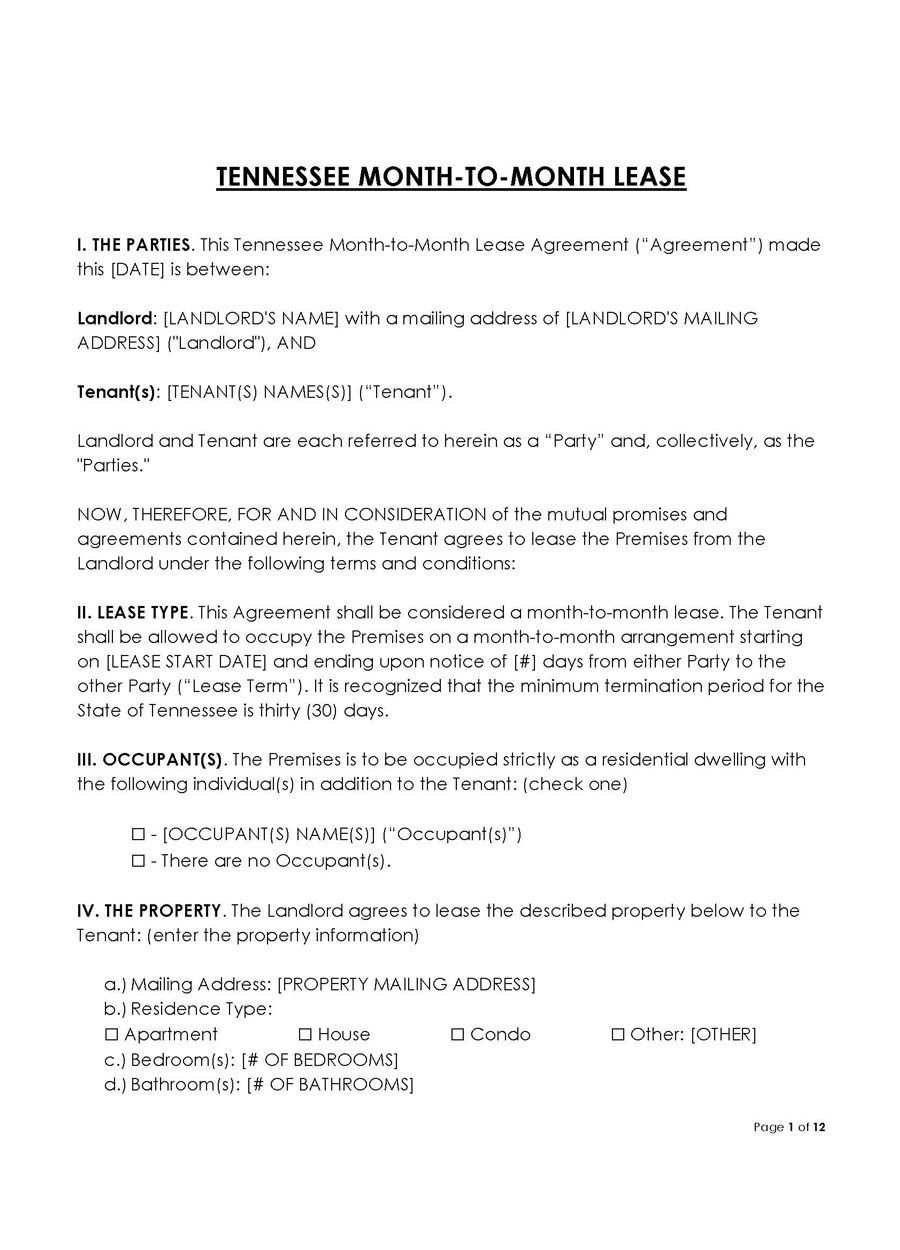
A Tennessee month-to-month agreement (also known as the tenancy-at-will agreement) is a rental contract between a landlord and a tenant that gives both parties the freedom to continue the contract until either party terminates it. In other words, with this kind of agreement, a tenant can live in an apartment for as long as they wish unless they or the landlord terminate the contract. However, it’s expected that both parties adhere to the contract’s terms and conditions, and if the lease is terminated, the party initiating the termination must provide a 30-day notice.
note
Before signing this type of lease, it is recommended that the landlord asks the tenant for a rental application to ascertain their credit and track record.
Rent-to-own lease agreement
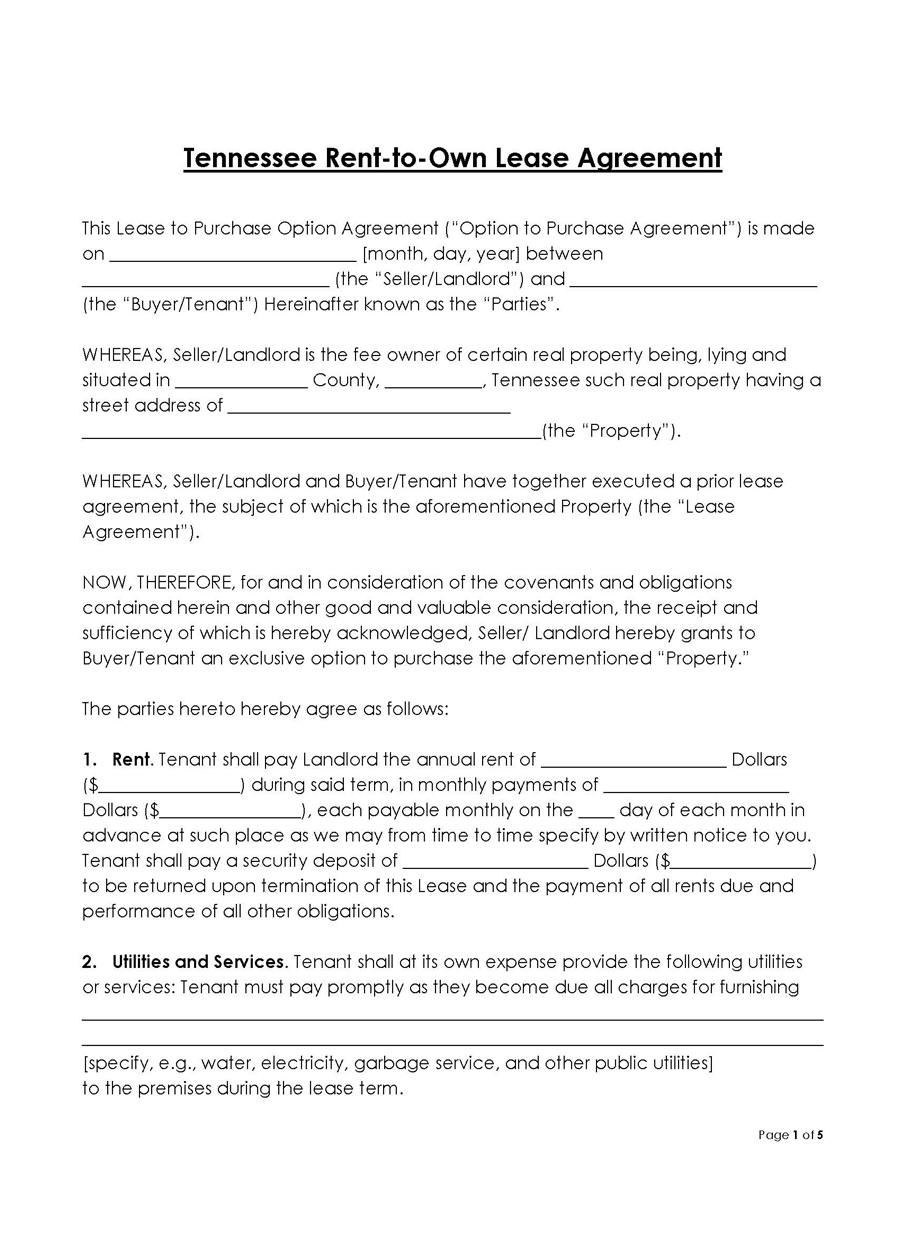
The Tennessee rent-to-own agreement is a legal residential contract between a landlord and tenant that gives the tenant a choice to buy a rented property after a certain period. In other words, this agreement contains a standard lease and an option to buy. And it includes information like the terms of purchase if the tenant will buy the property, the lease period, etc..
Roommate lease agreement
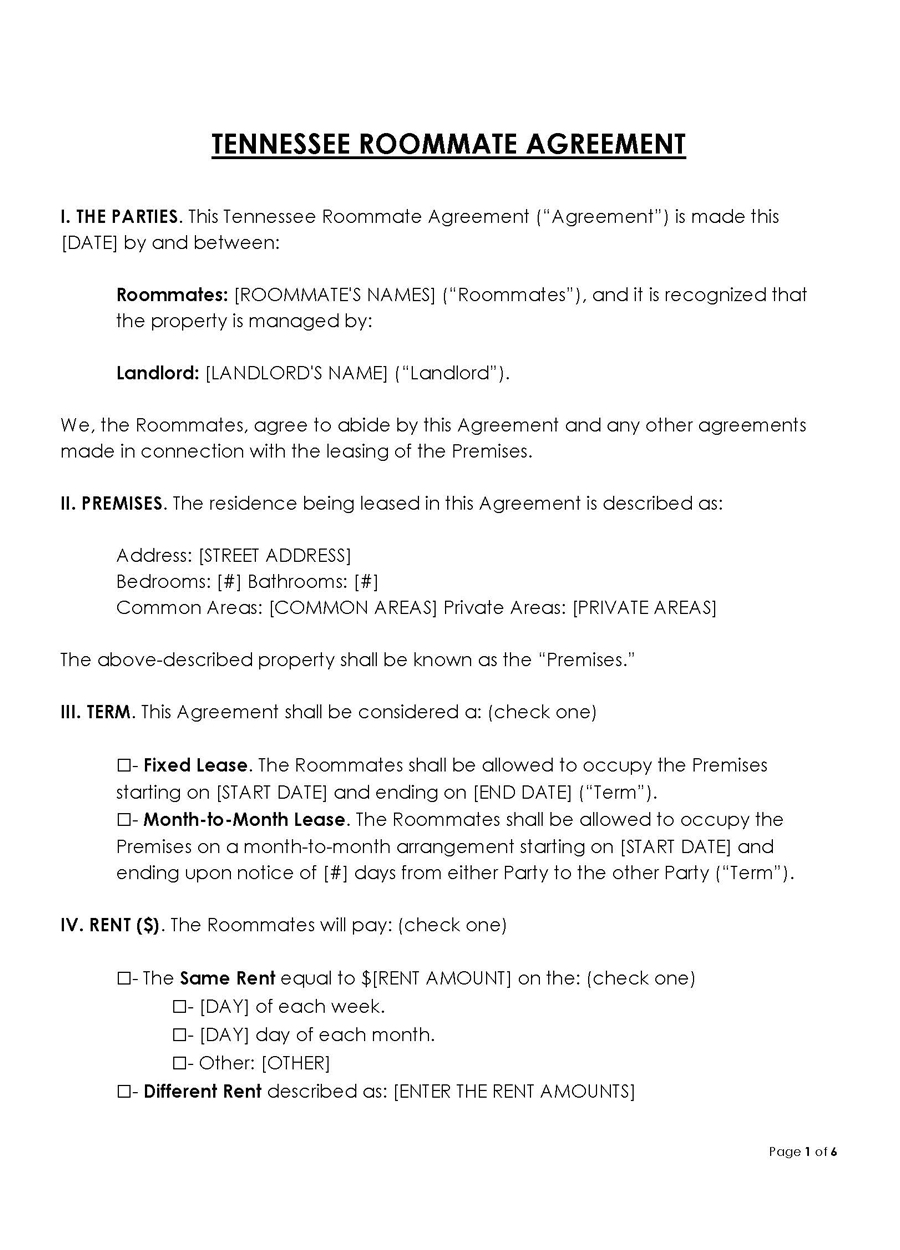
This agreement is a legal contract between two co-tenants sharing the same apartment in Tennessee. Generally, the document contains information about bill-sharing, property cleaning, and general maintenance.
Standard lease agreement
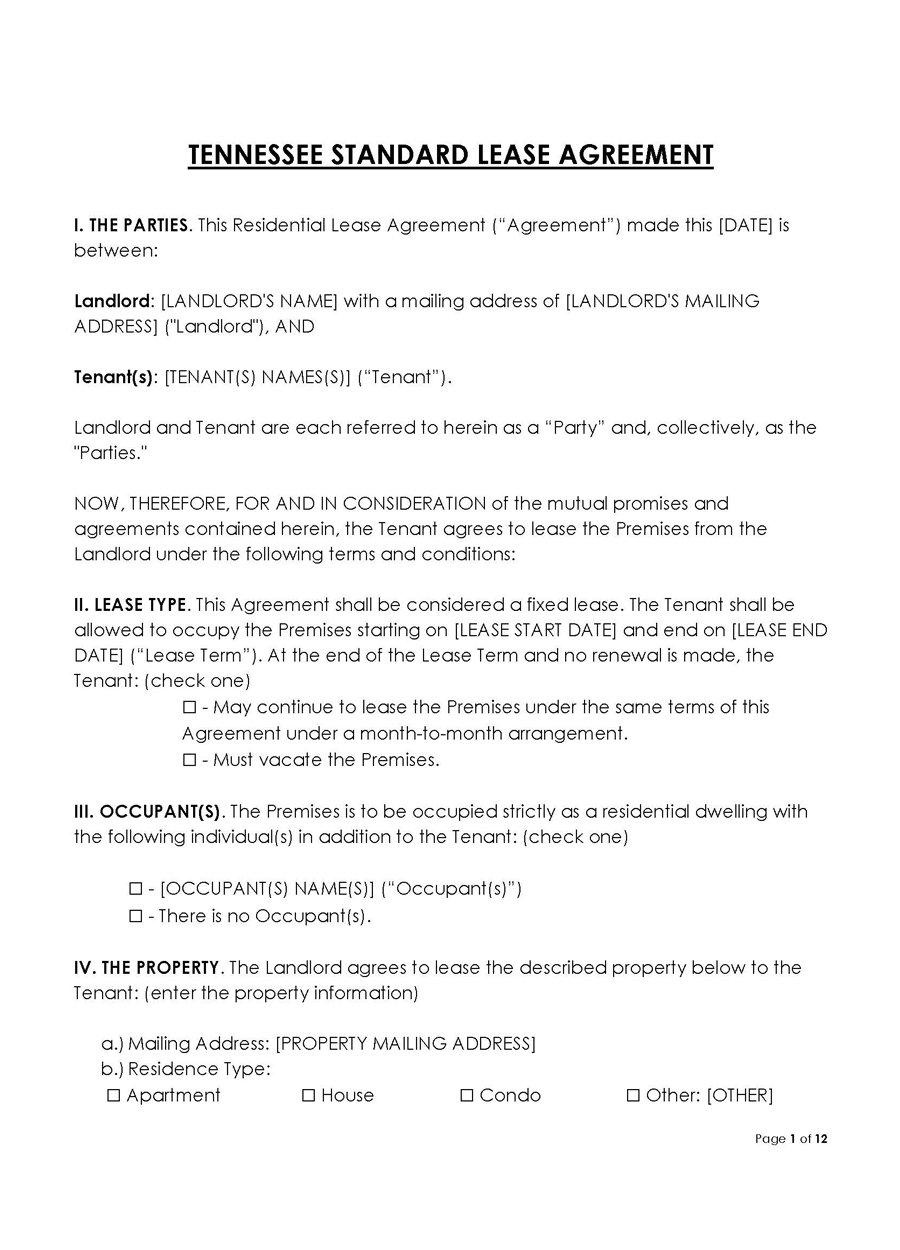
This agreement is the joint agreement between a landlord and tenant for a lease term with a start and end date. It will also provide other information like the terms and conditions, rent amount, late fee penalty, etc. Before the contract is signed, it will be best for the landlord to confirm the tenant has a good credit record and employment, and both parties should carefully read through the document.
Sublease agreement
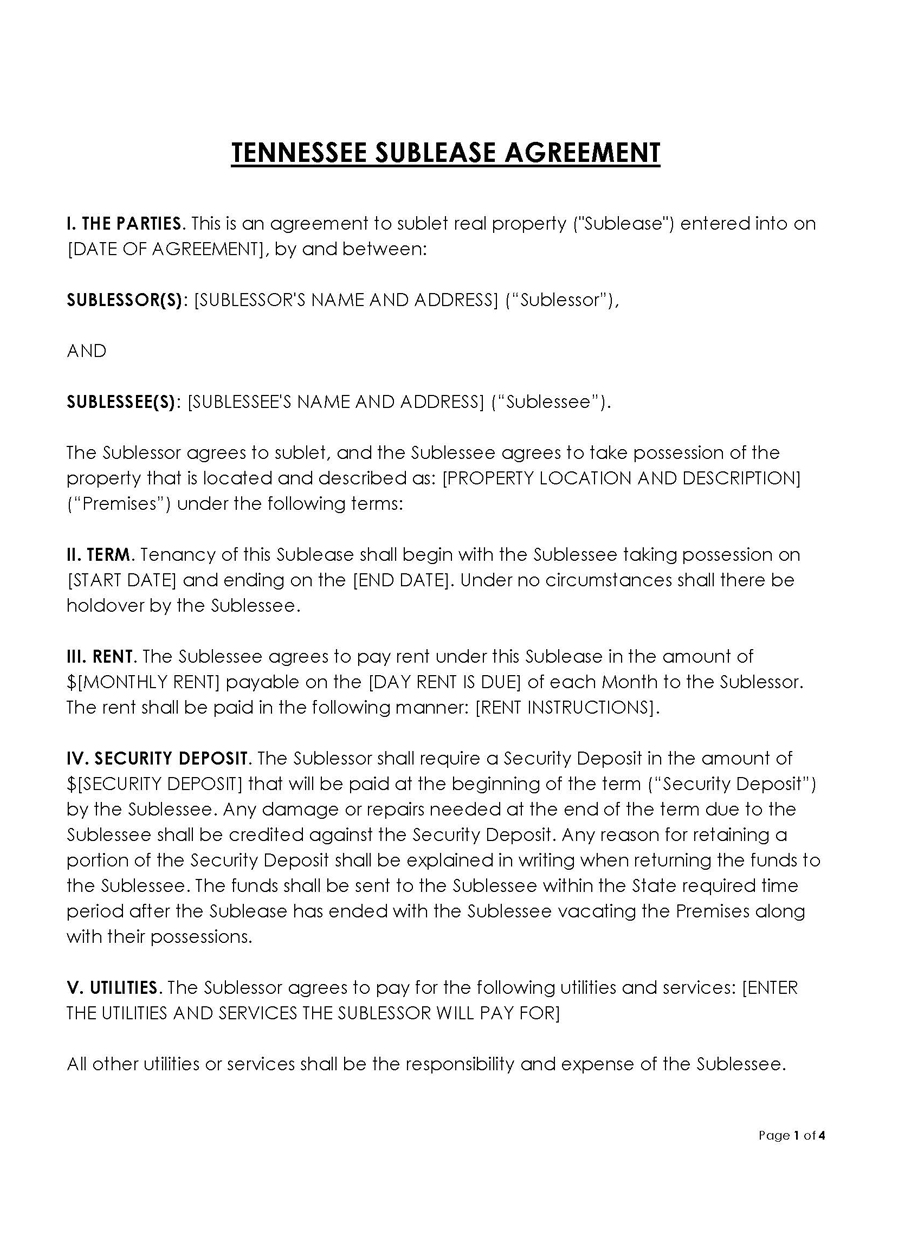
A Tennessee sublease agreement is used when a tenant wants to rent out a residential space to someone else while there is an ongoing contract between both landlord and tenant. Before a sublease agreement becomes binding, it must be authorized by the landlord. So, a tenant must seek their landlord’s consent (and signature) before subletting an apartment. Though the sub-lessor is expected to fulfill their contract obligations, the contract remains between the primary or master lessee and the landlord. Similarly, the sub-lessor will be responsible for taking care of the property and rent payment. So, before subletting a property, the master tenant should be sure with whom they’re entering a contract. If the sub-lessee defaults, the primary tenant can be held responsible.
Required Disclosures
As per the laws of Tennessee, there are disclosures a landlord must make in the agreement.
Not doing so renders the lease agreement non-binding:
Landlord/agent’s name and address
The landlord or property manager must include their name and address in the agreement for all rental units in Tennessee. Usually, this should be done before the tenancy commencement so that the landlord can address legal notices and demands accordingly.
Lead-based painting
Any rental property in Tennessee built before 1978 will most likely have lead-based paint inside it. In essence, such a property owner must disclose this information and the risks associated with living in an apartment with lead-based painting to a tenant before the tenant moves in.
Showings
In Tennessee, a landlord must include a right to enter showings disclosure in the agreement for apartments the landlord or property manager wishes to show other people before an existing lease tenure. Showings must be done with the tenant’s consent, but in some cases, a landlord may enter the property without the tenant’s permission within 30 days before the end of the lease, provided the landlord gives the tenant a 24-hour notice.
Medical marijuana use
Another vital piece of information in the agreement is the landlord’s position on medical marijuana use. The Tennessee law permits the landlord to ban marijuana smoking on their property. But in a case where smoking marijuana is permitted, they should clearly state where tenants can smoke on the property to protect other tenants.
Move-in checklist
It will be best for a landlord or property manager to have a checklist that highlights what damages a tenant will be responsible for before they move in. The landlord may attach the list to the rental agreement or sign it separately.
Late and returned check fees
In Tennessee, landlords should clearly state the penalty fee for late rent payments or checks returned (bounced) from the bank. The state pegs this fee at 10% of the rent amount due, and landlords must only charge it five days after the tenant’s default.
Shared utility arrangements
For shared apartments, landlords are expected to disclose which utilities are shared, how they are shared, and their associated bills. By doing so, each tenant will be able to calculate their additional bills based on which utilities they use.
Bed bug disclosure
Suppose the property has a history of bed bug infestation. In that case, the landlord should disclose this in their agreement and provide the tenant with the necessary information they need to have about managing the situation. This notification will prepare them for what is to come and help them cooperate with the landlord to control the bed bug infestation.
Asbestos disclosure
For rental properties built before 1981, asbestos materials likely make up the building. In Tennessee, if the landlord’s rental unit falls in this category, they should disclose it to the tenant so they don’t do things that can damage the asbestos without the landlord’s consent.
Mold disclosure
Mold disclosure is critical when leasing a property in Tennessee. So the property owner must inform a potential tenant of their apartment’s mold status before signing the agreement. In addition, the tenant will be responsible for mold damages that occur due to their negligence during their lease term.
How to Write a Tennessee Lease Agreement
When writing the agreement, the landlord must follow the stipulations of the Tennessee landlord-tenant laws and the federal laws for the lease to be legally binding.
It will help if they have an attorney read through the agreement before they sign:
Names of concerned parties
This includes the landlord’s name or the property management company in charge of the building and the tenant’s legal name.
Property address
This is the full address of the property’s location. Include information like the city, zip code, and property number.
Lease term details
This is the information about the type the agreement the parties are entering. It should be clearly stated what kind of leave agreement it is and the length of the lease.
Rent details
This section should include the lease’s start date, monthly rent amount, the specific day the rent is due, and where the rent should be paid.
Late fee
This is the amount the tenant must pay after defaulting to pay their rent as of when due.
Security deposit
This is the deposit a tenant must pay before moving into the property. It is usually kept by the landlord to fix damages caused by the tenant. The landlord should clearly state the amount.
Initial payment
This section covers the total amount a tenant must first pay to move into the property. It is the addition of the first month’s rent and the security deposit.
Details of occupants
In this section, the landlord should list the legal name of every tenant in their residential property. If the tenants have partners and children, their names should also be included. For commercial properties, everyone with access to the space should be listed. And if having more people use the property comes with extra cost, it should be clearly stated by the property owner.
Details of utilities
The landlord should highlight the utilities/services a tenant won’t pay for in this section.
Parking information
This section provides the tenant with information regarding a parking space. It helps the tenant understand if they’ll get a parking space or not.
Furnishing
In this section, the landlord highlights the equipment and appliances a tenant can and cannot install. And if a tenant isn’t allowed to move in with their appliances, it should be disclosed here.
Notices
Here, both the landlord’s and tenant’s names and mailing addresses are documented so that a notice can be sent there from either party.
Eviction details
This section helps the tenant understand the landlord’s grounds for eviction, especially regarding default in rent payment or other contract breaches.
Additional information
Here, the landlord adds any information they consider essential to the agreement that hasn’t been mentioned in any other sections.
Signature and date
Finally, the parties involved sign and date the agreement to become binding.
Landlord and Tenant Laws
There are additional legal requirements for landlords and tenants to consider in their agreement in Tennessee.
They include:
Security deposit
According to the Tennessee State Code, there’s no limit to how much a landlord can charge a tenant as their property’s security deposit.
Right of entry
In Tennessee, a landlord doesn’t need to give their tenant an oral or written notice before entering their property.
Abandonment
Suppose a tenant is out of a rented Tennessee apartment for a minimum of 30 days without paying rent or explanation to the landlord. In that case, the landlord can assume such a tenant has abandoned the property. Similarly, if a tenant doesn’t pay their rent up to 15 days after the due date and indications they no longer reside in the property, their landlord may assume the property has been abandoned.
Prospective tenant
A landlord may show a rental property to potential tenants when the current tenant has 30 days left on their lease. However, this detail must be included in the agreement. The landlord must also notify the tenant 24 hours before showing up with potential future tenants at the rental property.
Tennessee Lease Agreement Templates
Frequently Asked Questions
A Tennessee standard residential lease can last a maximum period of 3 years. If for more than three years, a lease must be written to be binding.
Yes. In Tennessee, once a written lease has been signed and dated by the landlord and tenant, it’s legally binding.
No. You don’t need to notarize your agreement in Tennessee. Once the lease is signed and dated by the parties involved, it’s already binding.
Yes. In Tennessee, lease agreements usually have an automatic renewal clause that makes it possible to renew (according to the lease term) if tenants and landlords have no contrary action.
